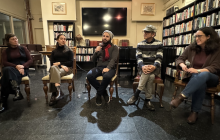By Selim Kuru
In this article, Dr. Selim Kuru sits down with Dr. Aria Fani to discuss developments in Persian & Iranian Studies, Translation Studies, and more.
This must be a significant year in your life with the publication of your first book, Reading Across Borders: Afghans, Iranians and Literary Nationalism (University of Texas, 2024), while you organized a series of events. Moreover, you continued your work in the Simpson Center's Translation Hub Project. How did these events, including your book talks and the resident program you organized in memory of our dear late Iraj Khademi, align with broader goals of promoting Persian language and cultural heritage?
Aria: This year was indeed momentous, not only for the publication of Reading Across Borders, which explores how Afghan and Iranian literatures negotiate concepts of belonging to a shared literary heritage, but also for the community-building work we accomplished at MELC and beyond. The 2024 MELC-PISP events were deeply rooted in the goal of honoring Persian language, literature, and cultural memory while reaching diverse audiences in Seattle and the broader Pacific Northwest. We collaborated with so many organizations: Third Place Books in Ravenna, Folio, NOTIS, Peyvand NPO, and others. The goal is to build a coalition and create communities of practice whenever possible.
The resident program dedicated to Iraj Khademi was a personal and collective effort to preserve his legacy while creating spaces for new critical engagements. Khademi’s lifelong commitment to Persian poetry, including his unwavering support of our program, inspired us to make the event not just commemorative but also forward-looking. By combining book talks, performances, and public-facing dialogues, we emphasized how Persian literature and culture exist both as a heritage and as a vibrant field of ongoing creation with contemporary relevance in the U.S. The events represented a broad geography of Persian literature, well beyond Iran.
What strategies did you use in curating themes and participants for this year’s events to ensure that they resonate with both academic and public audiences?
Aria: We had to carefully bridge the critical with the accessible. I leaned on thematic threads that are at once scholarly and relatable—translation, transnationalism, and cultural memory. For instance, my own work on literary nationalism underscores questions of identity and community.
Participants were chosen for their ability to articulate complex ideas in ways that inspire curiosity. For example, the book talks brought together Persian Studies scholars with translators and even poets, who offered fresh, intimate perspectives on the Persian literary tradition. We also incorporated workshops and discussions that invited the audience into the process—translation, interpretation, or reading practices. In doing so, the events functioned not as siloed academic conversations but as opportunities for collective reflection, inquiry, and celebration.
Could you share insights into the collaborative efforts or partnerships that were critical to the success of the 2024 events?
Aria: Collaboration was absolutely key to the success of this year’s programming. Working with the community is essential. If you want community members to attend your events, then you must listen to them, solicit their input, and open the doors of the university for them. In the past few years, the Persian and Iranian studies at MELC has proudly attracted members of the Afghan community in Washington State. This is because we take the study of Afghanistan seriously here. In 2021-22, UW was instrumental in organizing a lecture series on Afghanistan in collaboration with UCLA and Stanford. In the past year, we have hosted Dr. Nasir Arian, a distinguished scholar of Persian literature in Afghanistan, and the award-winning Afghan writer, Mohammad Asef Soltanzadeh. This is my approach with respect to all communities, whether they be literary translators, immigration rights advocates, or Persian speakers. You must show up for people so they show up for you.
Can you tell us about the Translation Studies Hub and its impact on your research and organization efforts?
Aria: The Translation Studies Hub, funded by the Simpson Center for the Humanities, provided critical infrastructure for envisioning interdisciplinary events. It offered not just material support but a thriving intellectual community of scholars and translators. I have had the chance to work with brilliant and dedicated colleagues in Sasha Senderovich, Nancy Bou-Ayash, Rich Watts, and Amanda Doxtater.
The TS Hub has covered so much ground since its inception in 2019. It has served as a platform for presenting research on translation studies at UW, locally, nationally and internationally. But we have also supported pedagogy through funded initiatives designed to incentivize the creation of Translation-Studies-focused courses and lectures. And we are about to get an advanced certificate in Translation Studies off the ground that will be housed in MELC!
Reflecting on the outcomes of the 2024 events, what do you see as the key achievements, and how might these inform the future trajectory of MELC-PISP?
Aria: I believe the greatest achievement has been the creation of inclusive, intergenerational, engaging spaces for dialogue. The events demonstrated that Persian Studies, as both an academic and public endeavor, can thrive through collaboration and community engagement.
Our efforts have built momentum for future MELC-PISP programming by
- Strengthening community ties: By partnering with local and regional institutions, we’ve laid a foundation for future events that will continue to engage diverse audiences.
- Promoting translation as a tool for engagement: The focus on Persian poetry and translation has underscored its potential as both a research method and a means of cultural outreach.
- Amplifying emerging voices: We prioritized the inclusion of young scholars and translators, ensuring that Persian Studies remains a dynamic and evolving field.
Looking forward, I hope to build on these achievements by further expanding our reach. This includes deepening partnerships with cultural organizations, supporting new translation projects, and developing future programs that engage high school and undergraduate students in Persian literary traditions. The 2024 events reaffirmed the power of Persian and Iranian Studies to connect past and present, local and global, academic and public—a trajectory I am deeply committed to advancing at UW and beyond.
